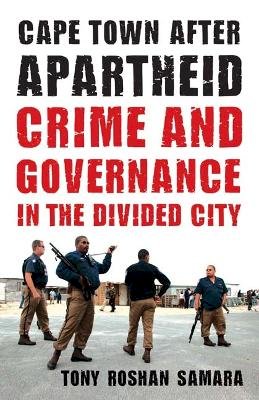
Stock image for illustration purposes only - book cover, edition or condition may vary.
Cape Town after Apartheid: Crime and Governance in the Divided City
Tony Roshan Samara
€ 36.58
FREE Delivery in Ireland
Description for Cape Town after Apartheid: Crime and Governance in the Divided City
Paperback. Num Pages: 272 pages, 6 b&w illustrations, 1 map, 1 table. BIC Classification: 1HFMS; JFF; JPF. Category: (G) General (US: Trade). Dimension: 215 x 140 x 16. Weight in Grams: 314.
Nearly two decades after the dismantling of apartheid in South Africa, how different does the nation look? In Cape Town, is hardening inequality under conditions of neoliberal globalization actually reproducing the repressive governance of the apartheid era? By exploring issues of urban security and development, Tony Roshan Samara brings to light the features of urban apartheid that increasingly mark not only Cape Town but also the global cities of our day-cities as diverse as Los Angeles, Rio de Janeiro, Paris, and Beijing.
Cape Town after Apartheid focuses on urban renewal and urban security policies and practices in the city center and townships as this aspiring world-class city actively pursues a neoliberal approach to development. The city’s attempt to escape its past is, however, constrained by crippling inequalities, racial and ethnic tensions, political turmoil, and persistent insecurity. Samara shows how governance in Cape Town remains rooted in the perceived need to control dangerous populations and protect a somewhat fragile and unpopular economic system. In urban areas around the world, where the affluent minority and poor majority live in relative proximity to each other, aggressive security practices and strict governance reflect and reproduce the divided city.
A critical case for understanding a transnational view of urban governance, especially in highly unequal, majority-poor cities, this closely observed study of postapartheid Cape Town affords valuable insight into how security and governance technologies from the global North combine with local forms to create new approaches to social control in cities across the global South.
Cape Town after Apartheid focuses on urban renewal and urban security policies and practices in the city center and townships as this aspiring world-class city actively pursues a neoliberal approach to development. The city’s attempt to escape its past is, however, constrained by crippling inequalities, racial and ethnic tensions, political turmoil, and persistent insecurity. Samara shows how governance in Cape Town remains rooted in the perceived need to control dangerous populations and protect a somewhat fragile and unpopular economic system. In urban areas around the world, where the affluent minority and poor majority live in relative proximity to each other, aggressive security practices and strict governance reflect and reproduce the divided city.
A critical case for understanding a transnational view of urban governance, especially in highly unequal, majority-poor cities, this closely observed study of postapartheid Cape Town affords valuable insight into how security and governance technologies from the global North combine with local forms to create new approaches to social control in cities across the global South.
Product Details
Format
Paperback
Publication date
2011
Publisher
University of Minnesota Press United States
Number of pages
272
Condition
New
Number of Pages
272
Place of Publication
Minnesota, United States
ISBN
9780816670017
SKU
V9780816670017
Shipping Time
Usually ships in 7 to 11 working days
Ref
99-1
About Tony Roshan Samara
Tony Roshan Samara is assistant professor of sociology and anthropology at George Mason University.
Reviews for Cape Town after Apartheid: Crime and Governance in the Divided City
"Cape Town after Apartheid is a major contribution to the field of urban studies and criminal justice. It provides a framework for understanding gangs, violence, and neoliberal crime policies, emphasizing how security policies are rooted both in neoliberalism and apartheid-era policy and how they serve to strengthen gangs and fail to stem violence." -John Hagedorn, author of A World of Gangs "Samara’s book masterfully connects the dots between local segregation in South Africa and what he calls the ‘transnational network of neoliberal urban governance.’ Samara’s brilliant treatment of crime, ‘terrorism,’ and gang violence also reminds us of the profound social degradation that the next struggle for genuine emancipation must confront." -Patrick Bond, University of KwaZulu-Natal Centre for Civil Society
